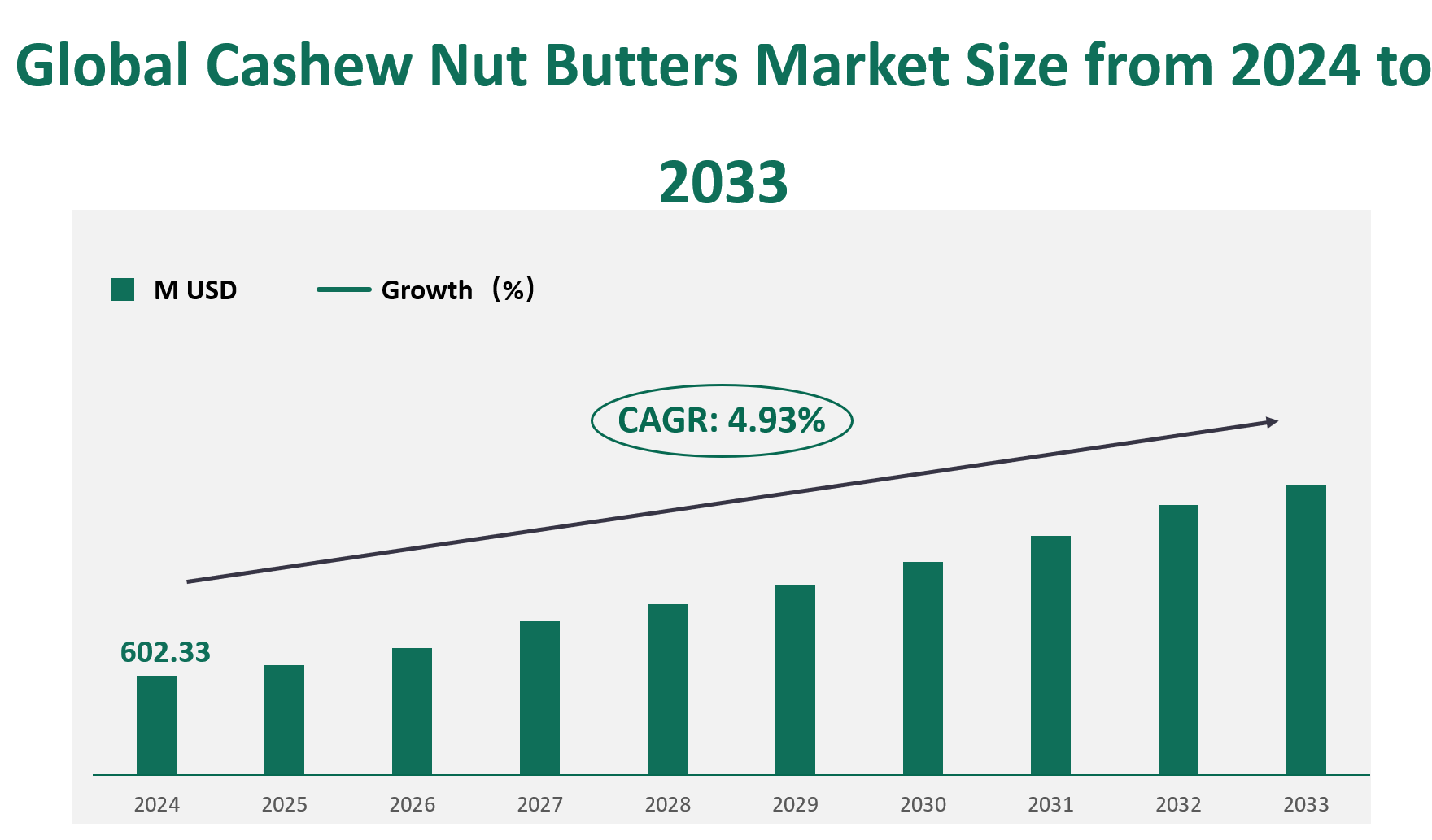1. Global Cashew Nut Butters Market Insight Analysis
The global cashew nut butters market value is projected to reach 602.33 million USD by 2024, with a compound annual growth rate (CAGR) of 4.93% from 2024 to 2033.
Cashew nut butters, a versatile and nutritious spread made from finely ground cashew nuts, have gained popularity due to their rich flavor and health benefits. They are often used as a dairy-free alternative in various recipes, making them particularly appealing to vegetarians and health-conscious consumers.
Figure Global Cashew Nut Butters Market Size (M USD) and CAGR (2024-2033)

2. Driving and Limiting Factors of Cashew Nut Butters Market Growth
The growth of the cashew nut butters market is driven by several key factors. Firstly, the increasing popularity of vegetarian and vegan diets has significantly contributed to the demand for cashew nut butters. As more consumers seek plant-based alternatives to traditional dairy products, cashew butter has emerged as a popular choice due to its creamy texture and rich flavor. According to the American Vegetarian Association, the number of vegetarians in the United States ranges between 2% and 8%, while Germany has 7.4 million vegetarians, accounting for 8.4% of the national population. Similar trends are observed in other countries, driving the demand for cashew nut butters.
Another driving factor is the rising health consciousness among consumers. Cashew nut butters are rich in essential nutrients such as protein, healthy fats, and dietary fiber. They are also free from cholesterol and trans fats, making them a healthier alternative to many other spreads. This has led to increased adoption by health-conscious individuals and those following specific dietary regimens.
The development of e-commerce platforms has also played a crucial role in expanding the market reach of cashew nut butters. Online shopping has made it easier for consumers to access a wider variety of products, including niche items like cashew nut butters. The convenience of home delivery and the ability to compare products and prices have further boosted demand.
Despite the positive outlook, the cashew nut butters market faces several challenges. One significant limitation is the fluctuation in raw material prices. Cashew nuts, the primary ingredient, are subject to price volatility due to factors such as weather conditions, supply chain disruptions, and changes in global demand. This can impact the production costs and profitability of manufacturers.
Food safety regulations also pose a challenge. The stringent quality control measures required by regulatory bodies increase the operational costs for manufacturers. Ensuring compliance with these regulations while maintaining profitability is a delicate balance that many companies struggle to achieve.
Additionally, the market is highly competitive, with several established players and new entrants vying for market share. This intense competition can lead to price wars and reduced profit margins. For new entrants, the challenge is even greater, as they must overcome barriers such as brand loyalty and established distribution networks.
3. Technology Innovation and Corporate Mergers and Acquisitions in Cashew Nut Butters Market
Technological innovation has played a pivotal role in the growth of the cashew nut butters market. Advances in processing techniques have improved the quality and consistency of cashew nut butters. For instance, new methods of roasting and grinding have enhanced the flavor and texture of the product. Additionally, the development of better packaging solutions has extended the shelf life of cashew nut butters, making them more attractive to retailers and consumers.
Corporate mergers and acquisitions have also shaped the market landscape. Major players such as Justin’s, Wild Friends, and Krema have expanded their market presence through strategic partnerships and acquisitions. These moves have allowed them to leverage synergies, improve distribution networks, and enhance their product portfolios. For example, Justin’s has consistently invested in research and development to introduce new flavors and formulations, catering to diverse consumer preferences.
4. Global Cashew Nut Butters Market Size by Type
Cashew nut butters are primarily categorized into two types: raw and roasted.
Raw cashew nut butter is made from raw cashews that have not been subjected to high heat. This type of butter retains more of the natural nutrients and enzymes found in cashews, making it a popular choice among health-conscious consumers. It is typically free from added sugars, oils, and preservatives, offering a pure and natural taste. The market value of raw cashew nut butter is projected to reach 191.79 million USD by 2024. Raw cashew nut butter currently holds a market share of approximately 31.84% (revenue basis).
Roasted cashew nut butter is made from cashews that have been roasted, which enhances the flavor and gives the butter a smoother texture. Roasting also helps to reduce the moisture content, making the butter more shelf-stable. However, the roasting process may slightly alter the nutritional profile of the cashews, potentially reducing some of the polyunsaturated fats. The market value of roasted cashew nut butter is forecasted to reach 410.54 million USD by 2024. Roasted cashew nut butter holds a market share of approximately 68.16% (revenue basis).
Table Global Cashew Nut Butters Market Size by Type in 2024
5. Global Cashew Nut Butters Market Size by Application
Supermarkets and hypermarkets are large retail outlets that offer a wide variety of products, including cashew nut butters. These stores cater to everyday shoppers and provide a convenient platform for consumers to purchase their preferred brands.
The market value for cashew nut butters sold through supermarkets and hypermarkets is projected to reach 210.73 million USD by 2024. Supermarkets and hypermarkets hold a market share of approximately 34.99% (revenue basis).
Convenience stores are smaller retail outlets that offer a limited range of everyday items, including snacks and beverages. They provide a quick and convenient shopping experience for consumers on-the-go. The market value for cashew nut butters sold through convenience stores is forecasted to reach 133.95 million USD by 2024. Convenience stores hold a market share of approximately 22.24%.
E-commerce refers to the sale of products through online platforms. This channel has revolutionized the way consumers shop, offering a wide range of products and the convenience of home delivery. The market value for cashew nut butters sold through e-commerce is projected to reach 154.22 million USD by 2024. E-commerce holds a market share of approximately 25.60%.
Table Global Cashew Nut Butters Market Size by Application in 2024
Application | Market Size (M USD) 2024 |
Supermarkets/Hypermarkets | 210.73 |
Convenience Stores | 133.95 |
E-Commerce | 154.22 |
Others | 103.42 |
6. Global Cashew Nut Butters Market by Top Regions
North America remains the largest regional market for cashew nut butters, with a market value of 226.10 million USD in 2024. The United States, in particular, has a strong market presence, with companies like Justin’s and Wild Friends leading the way. The region’s market share is expected to remain robust, supported by ongoing health trends and the growing popularity of plant-based diets.
Europe is the second-largest market for cashew nut butters. Europe is another significant market, with a projected value of 195.11 million USD by 2024. The region’s market is characterized by a mature consumer base and a strong preference for organic and natural products.
China represents a rapidly growing market for cashew nut butters, with a projected market value of 48.89 million USD by 2024. The region’s growth is also supported by the expanding e-commerce sector, which provides greater accessibility to consumers.
Japan is a significant market for cashew nut butters, with a strong consumer preference for high-quality and nutritious food products. The market value is expected to reach 46.81 million USD by 2024, supported by the country’s aging population and growing health consciousness. Japan’s market is characterized by a high level of brand loyalty and a preference for premium products.
The Middle East and Africa region is a growing market for cashew nut butters, with a projected market value of 27.40 million USD by 2024. The region’s growth is driven by increasing disposable incomes and a growing middle class, particularly in countries like the United Arab Emirates and South Africa. The market is also supported by the expanding presence of international brands and the growing popularity of Western food products.
South America is a smaller but growing market for cashew nut butters, with a projected market value of 24.06 million USD by 2024. The region’s growth is driven by increasing health awareness and the expanding presence of international brands. Brazil and Argentina are key markets in the region, supported by growing consumer demand for healthy and nutritious food products.
Figure Global Cashew Nut Butters Market Size by Region in 2024

7. Global Cashew Nut Butters Market Analysis by Major Players
7.1 Justin’s
Company Introduction and Business Overview: Justin’s is a leading American brand known for its natural and organic nut butters. Founded in 2004, the company specializes in producing high-quality cashew nut butters and peanut butter cups. Justin’s products are sold primarily in the United States, with a strong presence in supermarkets and online platforms.
Products Offered: Justin’s offers a variety of cashew nut butters, including raw and roasted options. Their products are known for their smooth texture and natural ingredients, appealing to health-conscious consumers.
7.2 Wild Friends
Company Introduction and Business Overview: Wild Friends is an innovative food brand specializing in non-GMO nut and seed butters. Founded in 2011, the company is known for its clean-label products and commitment to sustainability. Wild Friends’ products are sold primarily in the United States, with a growing presence in online markets.
Products Offered: Wild Friends offers a range of cashew nut butters, including flavored varieties and blends with other nuts and seeds. Their products are designed to appeal to consumers looking for healthy and delicious options.
7.3 Krema
Company Introduction and Business Overview: Krema is a well-established brand with a long history dating back to 1898. The company produces a variety of nut butters, including cashew nut butter, and is known for its commitment to quality and innovation. Krema’s products are sold primarily in the United States, with a strong presence in supermarkets and specialty stores.
Products Offered: Krema offers both raw and roasted cashew nut butters, as well as a range of other nut butter products. Their products are known for their smooth texture and natural ingredients.

